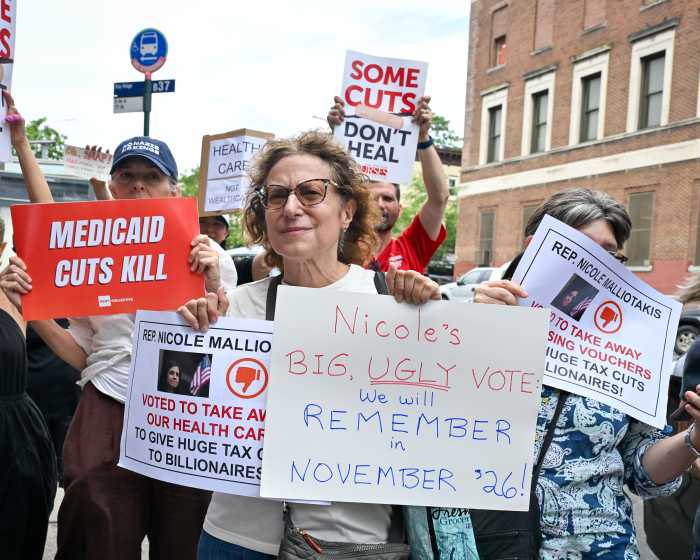Twenty-five years ago, the smells wafting up from the cracks between cobblestones
in DUMBO weren’t a topic anyone would call the city about.
Back then, it was still almost exclusively a manufacturing district.
Now, with a growing skyline of residential towers fit as much for Broadway
as Brooklyn, and starving artists being replaced by well-to-do families,
a longtime wastepaper recycling facility finds itself in a head-to-head
battle with emboldened residential neighbors, many of who have lived in
DUMBO for years waiting for the balance to shift from industrial to residential.
Chambers Paper Fibres, a wastepaper recycling plant that has a long-term
contract with the city’s Department of Sanitation, faces violations
issued from police and the city Department Environmental Protection. But
the state agency with overall jurisdiction over the plant, the Department
of Environmental Conservation, has yet to raise a stink over the complaints
of DUMBO residents.
Neighbors are starting to ask why.
“It’s always been bad, but they have stepped up their processing
capacity from what I can tell,” said Dana Kurtin, who lives in a
loft upstairs from the Jay Street plant.
“They’ve stepped up what’s going through, but they’re
not very considerate of their neighbors to be honest,” said Kurtin.
“I think they have this feeling that because they’ve been here
first, they don’t really have to do anything.”
Since 1998, the DUMBO Neighborhood Association (DNA), as well as residents
of Pearl Street, Plymouth Street and Jay Street, which abut the waste
paper recycling plant at 139 Plymouth St., have issued letters of complaint
to every agency or official body they could think of, including Community
Board 2, local elected officials, the city’s Sanitation, Transportation
and Environmental Protection agencies and the state Department of Environmental
Conservation, all, they say, to no avail.
This summer, the DNA re-launched its longtime campaign to get the city
to crack down on the plant, and issued a letter to the 84th Police Precinct,
asking for assistance in combating the general untidiness on the block
it occupies.
The precinct’s commanding officer, Capt. Philip Sferrazza, in a letter
dated June 25, responded by saying that 900 tickets had been issued to
Chambers Paper Fibres since April 1 of this year.
“Violations include blocking traffic lanes, parking on sidewalks,
detached trailers and illegal parking. We have also issued summonses for
idling trucks and, in response to your request, are instructing officers
to pay special attention to that offense,” wrote Sferrazza.
The police tickets only represent one of a plethora of problems the company
faces.
Kurtin, whose husband, Alec Drummond, has lived in the neighborhood since
1985, said they had to move their bedroom within the loft because dust
and exhaust from the factory was so volatile.
“The exhaust comes straight up into our house, and we have a little
baby,” she said, mentioning their year-old daughter, Mazie.
“In the summertime, when the windows are open, forget it. The [trucks]
sit there, and they idle and they idle and they idle,” she said.
She said that over the 12 years she has lived there, the company has shown
no sign that it has gotten the message.
“It smells bad, luckily the wind doesn’t blow it up to where
we are. There are actually people who live [directly] above that. I don’t
know how they deal with it,” she said.
A major stumbling block to getting the complaints addressed, she said,
is that Chambers Paper Fibres owns the building.
Charlie Rotante, the manager of Chambers Paper Fibres, said when asked
about the company’s alleged indiscretions, that it wasn’t anybody’s
business but his own, and asked which neighbors had called to complain.
“Who’s calling about this?” he asked. “Which neighbors?”
Told it was several residents in the area, he told The Brooklyn Papers,
“So what does that have to do with the cost of peas, what does that
have to do with you? Why would you worry? If anybody calls to complain,
give them my name and number and let them discuss that with me.”
He went on to say, “We were here before they were here. This is a
commercial area, half of them are illegal occupants … I don’t
think you should pay them any mind.”
Ian Michaels, a spokesman for the DEP, said Chambers Paper Fibres has
a history of violations.
“There were 15 violations since 2003,” of which, Michaels said,
13 were paid off to the tune of $2,950. Eleven were street surface violations,
he said, one was a fire safety violation, and three were issued by [the
Department of] Sanitation for non-compliance.
Michaels said that most of the violations “were street-type violations,”
meaning they may be due to unloading on the street, parking on the street
with the trucks loaded with trash, or leaving garbage behind on the street.
“If it’s an odor condition, that would be this department; if
it’s an idling truck situation, that would also be DEP; if it’s
people parking trucks where they’re not supposed to park it, I don’t
know who handles that,” he said.
Taryn Duckett, a spokeswoman for the Sanitation Department, said that
while the agency contracted with Chambers, it was limited in terms of
its oversight of the company.
“This Chambers Paper [Fibres] is a facility that we do use, however,
we do not issue the permit to them,” she said, explaining that task
was handled by the state Department of Environmental Conservation.
Asked about the company’s history with the DEC, Maureen Wren, a spokeswoman
for the state agency, said that although the company is regularly subject
to inspections, they have never been issued a violation.
“They do inspections regularly by the department, but there have
been no violations to date with this facility,” Wren said, adding
that the last inspection was June 9. “To date, they have no violations
with the DEC.”
Duckett said that as a city agency, the Sanitation Department can only
monitor what goes on in the streets. “We have contact with them,
but we can’t control them,” she said of Chambers.
“So they’ve received parking violations, from parking on the
sidewalks, idling, sidewalk obstructions, dirty sidewalk, things of that
nature,” Duckett said. “The last summons they received was last
month, and before then they hadn’t received one for a while. It is
an area that we continue to work with and will continue to monitor.”
One DUMBO resident, who spoke on condition of anonymity, expressed disbelief
that Chambers could have a clean record with respect to their internal
operations.
She recalled how complaints to elected officials and the community board
would result in spurts of ticket blitzes, but provide no long-term supervision.
“Everyone would get ticketed except for Chambers. And they were the
most offensive,” said the artist, who has lived on Jay Street, between
Water and Pearl streets, since 1980.
Back then, she said, she didn’t consider it such a problem. Now,
she has a young daughter.
“You tend to not use that block,” she said. “Really, it’s
just kind of gross. I find it shocking that other businesses have not
complained.”






















